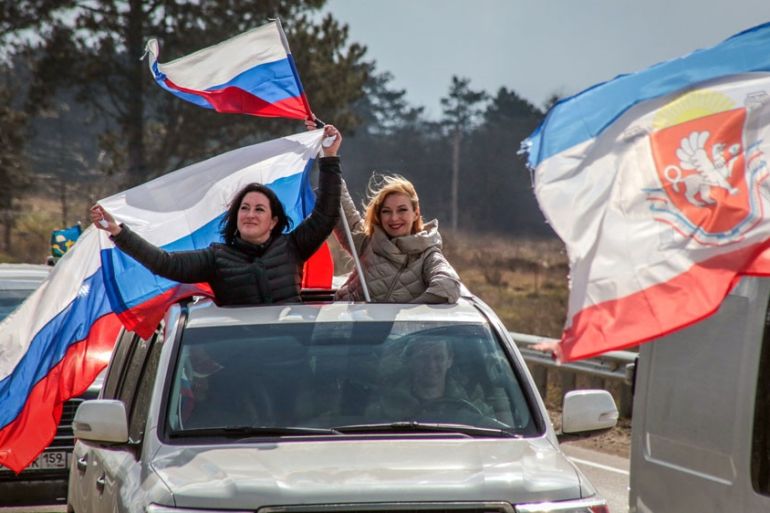UN resolution condemns Russia’s occupation of Crimea
General Assembly urges withdrawal of Russian military forces from occupied Ukrainian peninsula ‘without delay’.

The UN General Assembly (UNGA) has approved a resolution condemning Russia’s occupation of Crimea and the city of Sevastapol and urged the withdrawal of its military forces “without delay”.
The vote in the 193-member Assembly on Monday was 63-19 in favour of the measure, with 66 nations abstaining and 45 not voting.
Keep reading
list of 3 itemsThe Distant Barking of Dogs: In the shadow of Ukraine’s war
Freed Ukrainian filmmaker receives human rights award
It came on the same day the presidents of Ukraine and Russia met in Paris and agreed to revive the peace process in the bloody separatist conflict in eastern Ukraine and exchange all prisoners.
Russia sent troops into Crimea and annexed the peninsula in 2014. It has supported separatist rebels in eastern Ukraine in a five-year war that has killed 14,000 people.
The resolution expressed the assembly’s “grave concern over the progressive militarisation of Crimea by the Russian Federation as the occupying power”, its use of seized Ukrainian military industry enterprises, and the conscription of Crimean residents into the Russian armed forces.
It underscored the “utmost concern about the dangerous increase in tensions and the unjustified use of force by the Russian Federation against Ukraine”.
In addition, the resolution highlighted Russia’s actions in parts of the Black Sea surrounding Crimea and in the Sea of Azov and the Kerch Strait.
It welcomed Russia’s release of 24 crew members from three Ukrainian naval vessels it seized last November and encouraged “further negotiations to ensure the release by the Russian Federation of all illegally detained Ukrainian citizens and their safe return to Ukraine”.
The UNGA in 2014 reaffirmed Ukraine’s sovereignty over Crimea and has adopted resolutions on the militarisation of and human rights abuses in Crimea.
Unlike Security Council resolutions, UNGA resolutions are not legally binding, though they do reflect world opinion.
Nuclearising Crimea
Ukraine’s UN ambassador, Volodymyr Yelchenko, introduced the resolution, saying Russia’s actions have “far-reaching consequences for security, not only in the Black Sea area, but in the whole south Europe, as well as in North Africa and the Middle East”.
In addition to the continuing militarisation of the Crimean peninsula, he said: “What is more alarming is that the occupying power is taking steps to nuclearise Crimea, in particular by deploying carriers and other means capable of delivering nuclear weapons, as well as by actively developing nuclear infrastructure on the peninsula.”
|
|
He stressed that Ukraine is a non-nuclear state and a party to the Nuclear Nonproliferation Treaty.
Yelchenko said the main goal of the resolution was to urge the withdrawal of Russian forces from Crimea and ensure it halts “harassment of commercial vessels and restrictions to international shipping in the Black Sea and the Sea of Azov”.
Russia’s deputy ambassador, Dmitry Polyansky, called the resolution “a politicised and provocative text that is based on allegations, speculations and distortions of facts”.
“People of Crimea have long made their choice. Exposed to a threat of a ‘blood-drenched massacre’ that was coming from nationalists who came to power in 2014, they decided to reunify with Russia,” he said.
Speaking before the vote, Polyansky said the resolution “is based on a bare-faced lie and assertions that things look bad for Crimeans, that they are languishing against the Russian annexation and occupation”. He invited diplomats to visit Crimea and see for themselves.
He accused Ukraine of trying “to impair the constructive course of the Paris meeting” on Monday between Ukrainian President Volodymyr Zelenskyy and Russian President Vladimir Putin.
In urging a “no” vote, Polyansky said what Zelenskyy told Russia in preparing for the meeting “is absolutely incompatible” with the resolution.